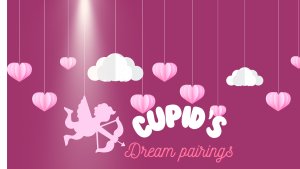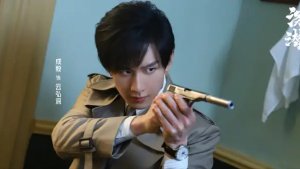 Disney+ renews Moving for Season 2
Disney+ renews Moving for Season 2
As a wise philosopher, whose glorious name I cannot fathom uttering, once said: "I'm so sick of this same old love..."
Far too many blogs, comments, and reviews have been shading on the romantic genre in all its illustrious expressions. That ancient wisdom described as "spilling the tea" is slowly becoming the conventional narrative against the seeming puerility and inconsequential nature of romance in dramatic works.
Therefore, in my power and authority as a self-appointed defender of Makjang, I couldn't sit silently and watch peeps berating on my most beloved passe-temps!
Indeed, many viewers may think that romance stories are "not original nor extraordinary" enough for their taste. But what if this is perhaps a matter of representation?
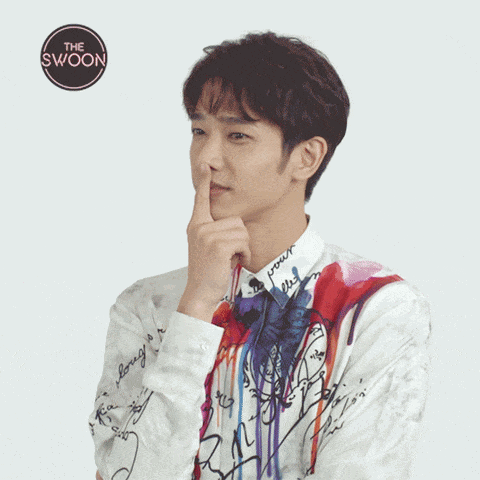 (Pexplexity - a random Jesper Liu gif)
(Pexplexity - a random Jesper Liu gif)
It may be presumptuous to voice but a viewer imposing their own expectations of what a story should be, while it was never intended to be a particular way in the first place... Isn't this in fact just a matter of a biased, self-indulgent perspective? Doesn't this personal evaluation fall under the very subjective nature of appraising beauty?
Who is to say that romance is "objectively" inferior to other narrative genres when the most beautiful classics and master works in all art forms have been centered around this lyrical and enchanting aspect of the human condition? Isn't the most sold literary masterpiece another love story? Aren't the most moving pieces of art eloquent expressions of love and its subtleties?
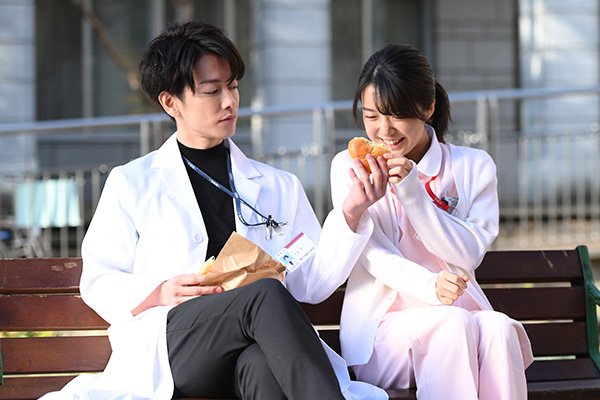 (Kairi Sensei, feed me too; onegai shimasu!)
(Kairi Sensei, feed me too; onegai shimasu!)
Sometimes, appreciating a content that is à priori "mediocre", whimsical, campy, or careless for what it is, what the writer intended it to be, and what it offers in terms of "mundane pleasure" may be better in regard to the viewer's individual experience and personal enjoyment.
If we consider for instance a romantic comedy's purpose, audience, and finality. All while understanding the genre's preconceived limitations, format, and restrictions that it imposes upon itself. Can we not, at the time, give it at least the merit of being innovative despite -and thanks to- its own predefined terms?
Romance may certainly in many instances be cheesy. It may be less than thought-provoking or life-changing, but what to make of the enactment of human passions and the cathartic appeal therein?
What about the representations of fundamental themes such as loss, longing, love, betrayal, self-realization, contentment..?
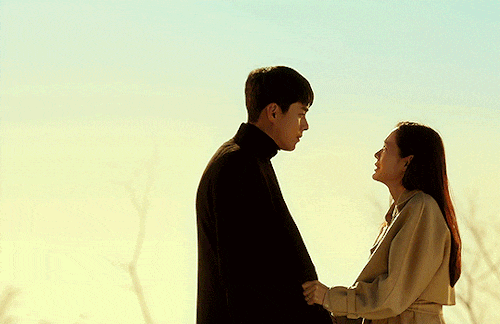 (Haven't even watched this one, the scene just looks dramat-chic)
(Haven't even watched this one, the scene just looks dramat-chic)
At first glance, all the romantic platitudes may seem vacuous through their common use of the cliché, by reason and -necessity- of their redundant nature.
Yet on an ad hoc basis, by virtue of those noticeable defects, they manifest a quintessential nature known to all mankind. Which in turn, facilitates their ordinary mimesic -almost spiritual- essence portrayal of those -all too familiar- things?
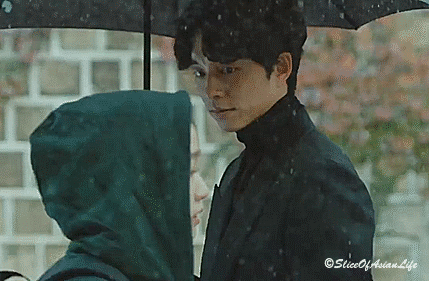 (I'm too tired to pretend that this scene isn't the epitome of originality)
(I'm too tired to pretend that this scene isn't the epitome of originality)
Through the ordinary, we may witness the distinguishable. Through the ritualistic, we may touch the essence of the sublime.
In that sense, comedy, drama, and tragedy are all banal artistic expressions of the exalted as much as anything else. As such, romance can be perceived as anything but inferior.
Admittedly, romance relies on easily recognizable tropes, easily identifiable patterns, discernible obstructions, obvious resolutions to conflict, as well as foreseeable, "much-anticipated" happy endings.
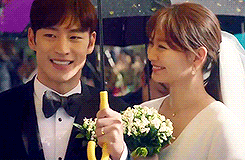 (I like to imagine myself as the bride.. Ehem, let us return to our sheeps)
(I like to imagine myself as the bride.. Ehem, let us return to our sheeps)
However the case, that does not make it worthless. Au contraire, the intrinsic value of such depictions lies within the boundaries of the recognizable realm. The "vraisemblance" is crucial in terms of representative appeal and the identification process. Romance's redundancy is an inseparable part the representamen it addresses. The usualness of this modus operandi is emblematic due to the familiarity of the object it reflects.
Those similitudes and inspirations are non-defaulting parties in the creative process, which in turn dictates the conventional dramatic property and the illusory narrative of the romantic expression.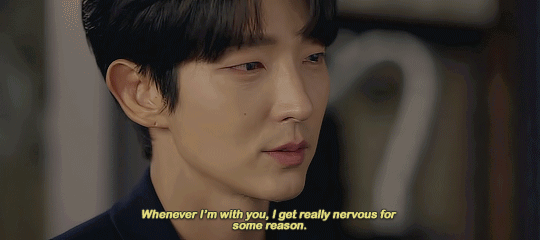 (I and the public know what all school children learn.. Seeing oppa nervous makes you flustered in return. xD)
(I and the public know what all school children learn.. Seeing oppa nervous makes you flustered in return. xD)
Likewise, in a paradigmatic analysis, the clichés and stereotypes portrayed in a story (all while serving meaning to certain ritualistic depictions) can also be humourously exaggerated and comically overturned as a form of subversion.
Both usages of the cliché help suspend and shorten the aesthetic distance by interrupting or reinforcing the underlying patterns of the romantic genre. Consequently, amplifying its expansion as a whole.
I mean, if the hero dies, isn't it most obvious that the palace maid should be the one to defeat the dragon? This much is common sense.
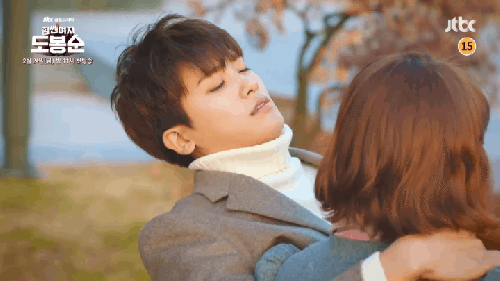 (Min Min being princess carried is the best thing ever.)
(Min Min being princess carried is the best thing ever.)
Accordingly, not all stories necessarily need to relay a profound message or contain some ancient arcane knowledge. Inversely, these adventures candidly and effortlessly present themselves as a woven mix of utility and pleasure.
As the courtship process can be equivocally sacred and whimsical without being antithetical. Correspondingly manifesting a portrayal of both the mundane and the sublime; beautifully interlaced in the image of an intimate transcendental distraction.
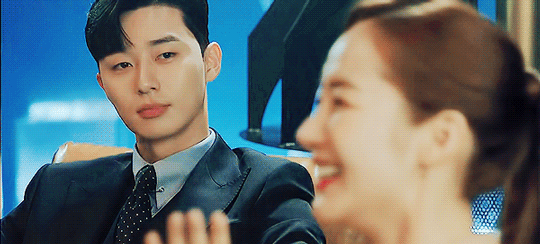 (Let's pretend this gif portrays a deeply poetic moment of "fin' amore")
(Let's pretend this gif portrays a deeply poetic moment of "fin' amore")
On the opposite end of that spectrum, in contrast to the poetic "dulcinea" or the weighty seriousness of a melo, the rule of cool, all gas no breaks, could also apply.
Chaos, edginess, class, and craziness ensues... et voila! We have a contemporary epic tale of a supremely individual gray character that overcomes all odds and wins the battle of wits with his oozing charisma and Chanel-dripping swag, with impactful lines, campy silliness, and ridiculous visual action that can make you squeal in excitement or put a silly grin on your ramyeon-stuffed face.
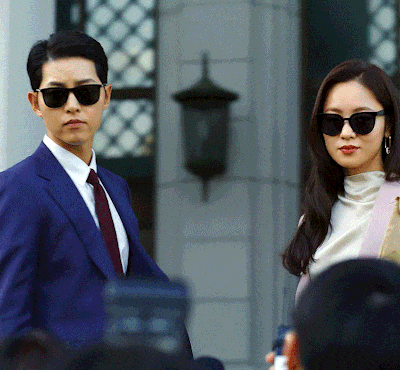 (When he says: "Korea di merda"... I felt that.)
(When he says: "Korea di merda"... I felt that.)
As romance seems to be filled with forced contrivance and unapologetic contradictions, it is also evident that the genre dictates (and allows) such ridiculous and over the top characterizations as well as irrational subversion to formal rules and traditions, consequently putting an emphasis on the creative spirit and the personable characters.
As romance operates within the confines of the predetermined yet limitless forms that love can take, it attempts to convey through the creative spirit, the lyrical, the imaginative, and the instinctive, as it touches upon the exalted ideals, the illusive nature of things as well as the celebration of the individual.
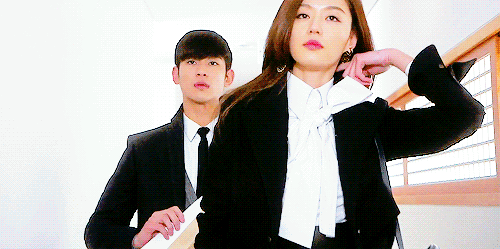 (Slay queen! That hair flip tho!)
(Slay queen! That hair flip tho!)
Beauty lies in the eyes of the beholder.
Similarly, my deepened appreciation of this particular type of perceived beauty is another case of the personal and the subjective human experience.
In conclusion, as the aesthetic properties of romance seek to evoke spontaneous emotional responses in the viewer, my positive and pleasant appraisal -in conjunction with negative evaluations- perhaps betrays my own romantic notion and is merely result of representations?
Thank you all sincerely for reading this far.
Love, Peace and Chicken Grease, from now on I'll be holding my peace!
Sincerely, the self-appointed defender of Makjang. ♥
DISCLAIMER: Please do not take this piece too seriously as I am waggishly presenting my personal opinion on the genre and awkwardly trying to revive its appeal among viewers. *Hits the woo*
The gifs and images used above are not my property. They are used from the internet as the credits are due to their rightful owners.



